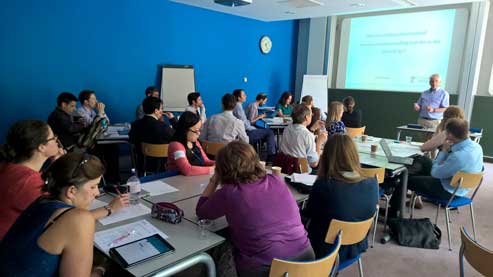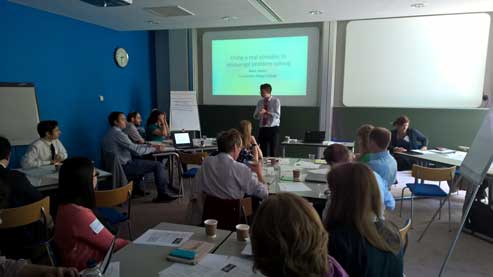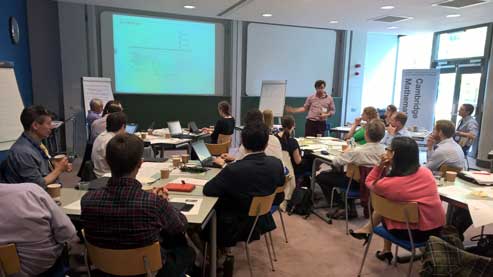We held the third Cambridge Mathematics seminar at the Faculty of Mathematics on the 12th May. The title of this blog was prompted by some work we have been doing on the place of mathematical modelling in the curriculum and, within that, the place of digital technology. The afternoon was organised around three different presentations with discussion episodes in between.

Our guests were Professors Geoff Wake (Nottingham ), Keiichi Nishimura (Gakugei University Tokyo) and Javier Garcia (Granada). Geoff set us thinking about what modelling is and suggested that:
• it is about taking a real world problem, simplifying it and solving it using mathematics
• a model is only a model if it can be used repeatedly
• since many modelling activities do not start from scratch, an important skill is making sense of the maths of others
• the tasks offered to students should have utility or purpose
• students can be more capable of modelling difficult situations than teachers sometimes predict; assuring them that simplifying a model, so long as the simplification is stated, is acceptable
• local contexts can be distracting in that students focus on irrelevant detail

Mark Dawes from Comberton Village College then shared some of the work that he had been using with his students. He sought to draw differences between strategies and models, and suggested that the difficult part of teaching modelling was helping students to move from specific examples to general re-usable models. He shared examples taken from the new Core Maths syllabus and indicated that much of the maths in the new syllabus offered appropriate and engaging contexts for similar questions.

Talk then moved to the use of digital technology in mathematical modelling, as David Vacarro from Highgate School shared some of the work his sixth form students have been exploring as extended projects. David indicated the progression from exploring and experimenting with a model devised by the teacher, to tweaking a model of a similar phenomenon to make it fit a new one, to devising a model from scratch. He agreed with Geoff that students can often achieve far more than one might predict, and gave examples of how they had modelled a Ponzi scheme, the spread of disease, and the visualisation of what happens to a drum skin when it is hit.
Because the seminar included colleagues from a range of backgrounds and international contexts, the discussions were wide ranging and useful and helped us to understand the affordances and constraints which apply to modelling in the classroom, assessing modelling, designing resources to support the place of modelling in schools, and what professional development would be helpful for teachers.
Lynne McClure
Director, Cambridge Mathematics